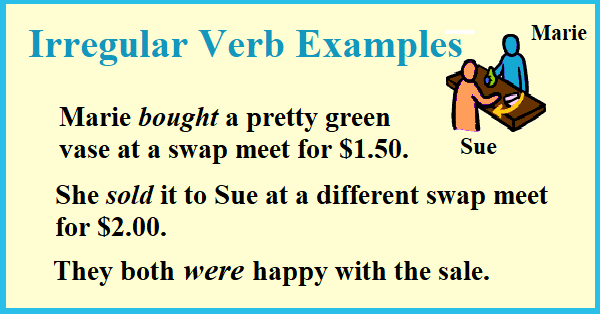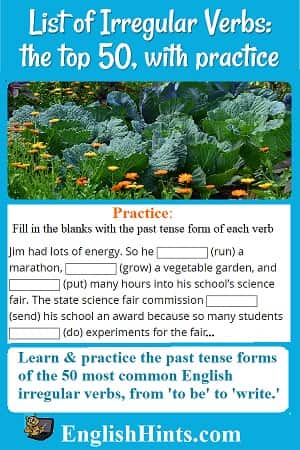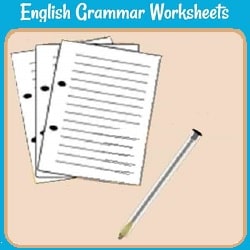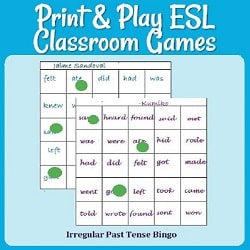List of Irregular
Verbs:
Practice the Top 50
Study this list of irregular verbs. Then practice them by filling in the blanks of two stories below with their past tense forms. Click here to go straight to the practice exercise.
Top 50 (Most Common) Irregular Verbs
1. be (am/is/are)-- was/were (see The verb to be for an explanation of its differences. It’s the only verb in English with 3 forms in the present and two in the past tense.)
2. become-- became
3. begin -- began
4. break-- broke
5. bring-- brought
6. buy-- bought

7. come--
came
8. cost-- cost
9. cut-- cut
10. do-- did
11. drink-- drank
12. drive-- drove
13. eat-- ate
14. fall-- fell
15. feel-- felt
16. find-- found
17. fight-- fought
18. get-- got
19. give-- gave
20. go-- went
21. grow-- grew
22. have (3rd person sing.: has)-- had
23. hear-- heard
24. hold-- held
25. keep-- kept
26. know-- knew
27. lead-- led
28. leave-- left
29. let-- let
30. make-- made
31. meet-- met
32. pay-- paid
33. put-- put
34. read (pronounced ‘reed’)-- read (pronounced ‘red’)

35. run-- ran
36. say-- said
37. see-- saw
38. sell-- sold
39. send--sent
40. set-- set
41. sit-- sat
42. speak-- spoke
43. stand-- stood
44. take-- took
45. teach-- taught
46. tell-- told
47. think-- thought
48. understand-- understood
49. win-- won
50. write-- wrote
Practice the Top 50 from the List of Irregular Verbs
Fill in the blanks with the past tense form of each verb in parentheses. When you finish, press “check” to see how many you remembered. (If any are not right, you can go back and correct them before checking again.)
See 12 Lists for Irregular Verbs in the Past Tense for an organized way to remember these verbs. (It includes over 30 others, too-- all the common irregular past tense verbs. It also gives their past participles.)
Irregular Past Particles lists all the past participles that differ from their simple past forms. It also gives lots of examples of how to use them.
There's a complete listing of irregular verbs at English Page Complete Irregulars List. (It also has flashcards and other practice.)
Practice Irregular Past Tense Verbs has another gap-fill to review irregular verbs. Its gap-fill discusses the history of U.S. immigration.
More Related Pages
The simple past tense of regular verbs ends in -ed. It's easy to form, and not hard to spell or pronounce if you learn a few easy rules.
Pdfs with grammar games & exercises for verb tenses (especially irregular past tense verbs), practice with sentence structure, etc.
Games are so useful in ESL classes! Get free printable puzzles, vocabulary matching games, and inexpensive packets of games to practice irregular verbs.
Didn't find what you
needed? Explain what you want in the search box below.
(For example, cognates, past tense practice, or 'get along with.') Click to see the related pages on EnglishHints.
| site search by freefind | advanced |











